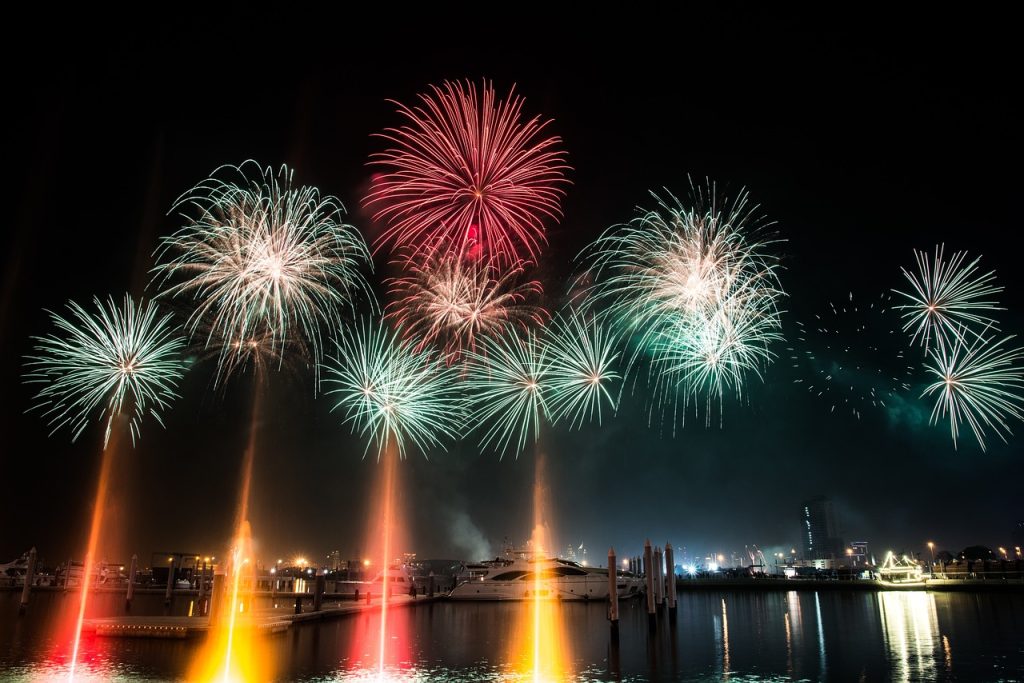Dubai has emerged as a premier tourist destination, captivating travelers around the globe. Nestled in the United Arab Emirates, this dynamic city showcases a fusion of modernity and Arabian charm, offering a wealth of attractions and experiences.
Dubai’s skyline is breathtaking, dominated by iconic structures like the Burj Khalifa, the tallest building in the world. And the luxurious Burj Al Arab Hotel is often hailed as a symbol of luxury. Visitors can soak in panoramic views from observation decks, dine in world-class restaurants, and indulge in unparalleled luxury.
Shopping enthusiasts are spoiled for choice in Dubai. The city boasts many retail experiences, from high-end designer boutiques in lavish malls to traditional souks brimming with local handicrafts and spices.
Dubai’s beaches beckon sun-seekers with pristine shores and crystal-clear waters along the Arabian Gulf. Visitors can relax, swim, or participate in water sports while enjoying the year-round sunshine.
In addition, the city’s commitment to hosting international events and festivals further enhances its appeal. Something exciting is always happening, from the Dubai Shopping Festival to world-renowned horse racing events like the Dubai World Cup. The gastronomic scene is equally diverse, offering a fusion of global flavors and authentic Middle Eastern cuisine.
Importance of Choosing the Best Time to Visit Dubai
You must consider the best time to visit Dubai for a comfortable, enjoyable, and memorable experience. Considering the weather, crowd levels, attraction availability, and cost. It lets you make the most of Dubai’s offers and tailor your trip to your preferences and priorities.
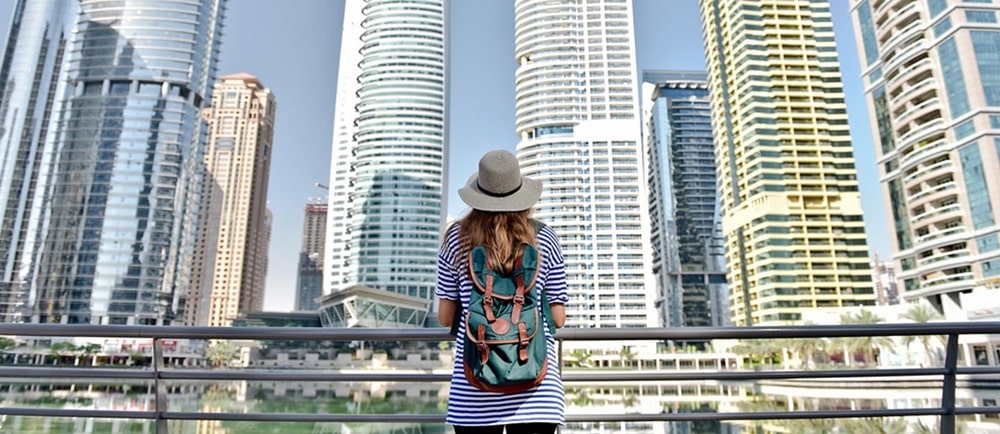
Here are a few factors to consider to determine on when is the best time to visit Dubai;
Weather:
Dubai experiences extreme temperatures, with scorching summers and milder winters. By choosing the right time to visit, you can avoid the sweltering heat of summer, with temperatures exceeding 40°C (104°F). To enjoy more comfortable weather during the winter season.
Comfort and Safety:
Dubai’s summer heat can be intense, with high humidity levels. Visiting during the cooler months ensures a more pleasant and comfortable stay. Also, the weather lets you enjoy outdoor attractions like beaches, desert activities, and sightseeing.
Crowd Levels:
Dubai is a popular tourist destination, and certain times of the year see a significant influx of visitors. Planning your visit during less crowded periods can enhance your experience by reducing wait times. Plus, it allows more intimate experiences at popular attractions and ensures a more relaxed and enjoyable stay.
Availability of Attractions and Events:
Dubai is known for its diverse attractions, events, and festivals. Proper consideration of when is the best time to visit Dubai allows you to align your trip with specific events or activities of interest.
Cost and Accommodation:
Traveling during off-peak or shoulder seasons can often result in more affordable flight tickets and accommodation rates. By choosing the best time to visit Dubai, you can maximize potential cost savings, allowing you to allocate your budget to other aspects of your trip or extend your stay.
Get Dubai Visa Before Starting Your Journey
Before embarking on your journey to Dubai, it is crucial to obtain a UAE tourist visa to ensure a smooth entry into the country. It is advisable to initiate the Dubai visa application process well before your actual travel dates to allow sufficient time for processing.
The application process involves filling out an online form and providing required documents such as a valid passport, passport-sized photographs, proof of travel arrangements, and accommodation. Hence, the most convenient and efficient way to obtain travel authorization is to apply for Dubai visa online.
This online visa application streamlines your travel preparations, ensures compliance with immigration requirements, and have a worry-free journey to this vibrant city.
Climates and Weather in Dubai
Generally, Dubai climate is characterized by hot and arid conditions throughout the year. The city has two main seasons: a hot summer and a milder winter.
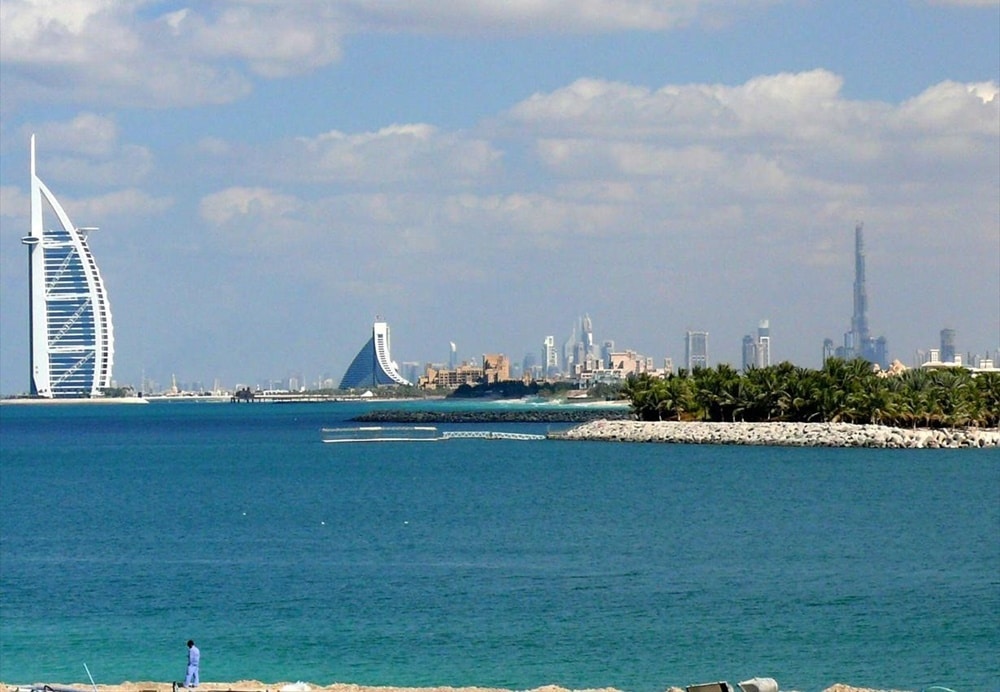
Summer (May to September):
Dubai becomes extremely hot and humid during summer. Temperatures with high humidity levels can soar above 40°C (104°F), making visits an intense and challenging time.
Winter (November to April):
Winter climate in Dubai is characterized by milder and more comfortable weather. Temperatures range from the mid-20s°C (mid 70s°F) to the low 30s°C (high 80s°F), providing a pleasant climate for outdoor activities and exploration.
The evenings can be cooler, especially in December and January, when temperatures drop to around 15°C (59°F). This is the peak tourist season, with many visitors worldwide.
Rainfall:
Dubai experiences minimal rainfall throughout the year, with most precipitation between November and February. Rainfall is generally infrequent and sporadic, and heavy downpours are rare.
Sandstorms:
Dubai is occasionally affected, especially during transitional periods between seasons. These sandstorms, known as “shamal,” can reduce visibility and cause disruptions. Following local advisories and taking necessary precautions when sandstorms are expected is advisable.
However, indoor facilities such as malls, hotels, and entertainment venues have air conditioners allowing you to enjoy Dubai’s offerings regardless of the outdoor condition and temperatures.
Seasons in Dubai
Dubai experiences distinct seasons throughout the year, with two primary seasons: summer and winter. Let’s delve into a detailed explanation of each season in Dubai.
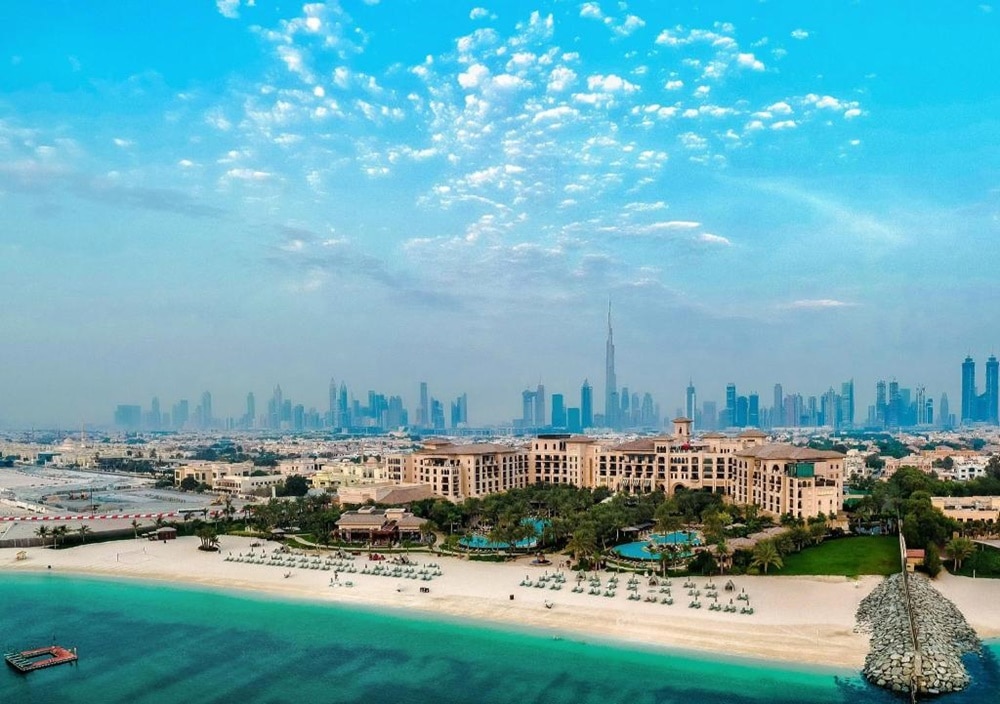
Summer (June to September):
Summer in Dubai is characterized by scorching heat and high humidity. Temperatures soar well above 40°C (104°F) during the day, and the humidity levels can make it feel even hotter. The sun is intense, and outdoor activities are limited due to the extreme heat.
When in summer in Dubai, it is advisable to stay indoors or seek air-conditioned spaces during the peak hours of the day. This season also coincides with Ramadan, the Islamic holy month, where locals observe fasting from sunrise to sunset.
Autumn (October to November):
Autumn transitions from the scorching summer to milder winter temperatures in Dubai. During this season, the weather begins to cool down, and the intensity of the summer heat gradually subsides.
Days are warm and pleasant, with temperatures ranging from the mid 20s°C (mid 70s°F) to the low 30s°C (high 80s°F). Evenings become more comfortable, and outdoor activities start to become more enjoyable.
Winter (December to February):
Winter in Dubai is the most popular season for tourists. The mild and pleasant weather makes it an ideal time for outdoor exploration and activities. Temperatures range from the mid 20s°C (mid 70s°F) during the day to 15°C or around 60°F during the cooler evenings.
It is a relief from the scorching heat of summer, and visitors can enjoy outdoor attractions, beaches, and various outdoor festivals and events. However, it’s worth noting that in winter in Dubai, popular attractions can be crowded.
Spring (March to May):
This season transitions to winter and summer. The temperatures gradually start to rise, accompanied by frequent sandstorms. Days are pleasant, with temperatures ranging from the mid 20s°C (mid 70s°F) to the low 30s°C (high 80s°F). However, as spring progress, the heat intensifies, and by late May, the summer heat starts to set in.
By understanding the different seasons in Dubai, you can plan your visits accordingly.
Peak Season in Dubai
The Dubai peak season occurs during the winter months from November to March. This period attracts a significant influx of tourists worldwide seeking to escape colder climates and enjoy Dubai’s pleasant weather. The peak season aligns with the city’s most comfortable temperatures and coincides with various events and festivals, making it an exciting time to visit.
During the peak season in Dubai, there are buzzes of activities, and popular attractions can be bustling with visitors. The city’s iconic landmarks, such as the Burj Khalifa, Dubai Mall, Palm Jumeirah, and the Dubai Fountain, are often crowded with tourists eager to explore.
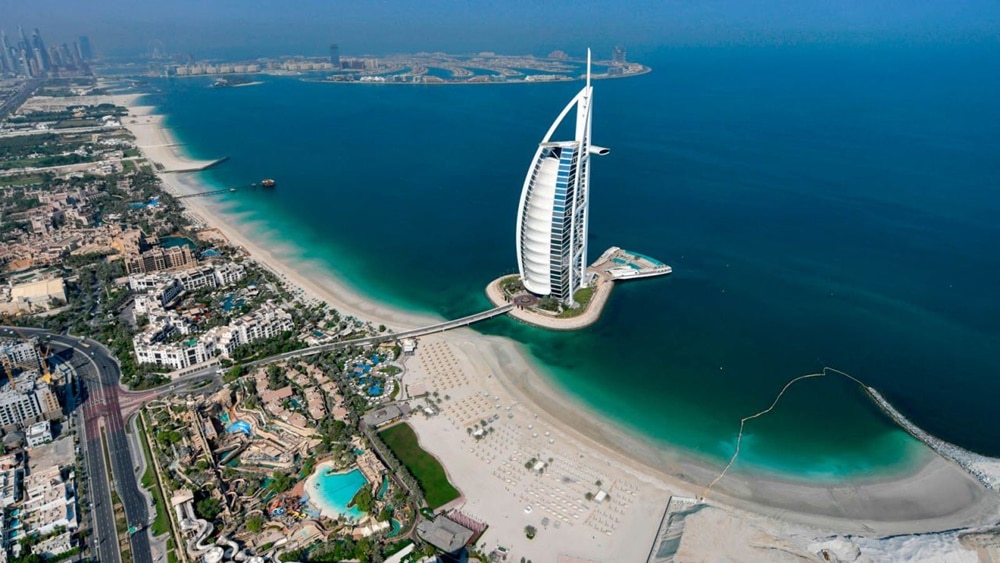
While the peak season offers an energetic and vibrant atmosphere, it’s important to consider that popular attractions, restaurants, and hotels may experience higher demand, resulting in potential price increases and the need for advanced reservations.
Hence it is advisable to plan and book accommodation, flight tickets, and activities well in advance to secure the best options and avoid disappointment.
Dubai festivals and events
The peak season coincides with various events, festivals, and exhibitions. These events add an extra layer of excitement and entertainment to the city, attracting visitors from all walks of life.
Dubai shopping festival:
The Dubai Shopping Festival (DSF) is a highly anticipated annual event showcasing Dubai’s status as a global destination. It is one of the world’s biggest and most popular shopping festivals. The festival typically takes place over a month, often from December to January, attracting millions of visitors from around the globe.
The city comes alive with exciting activities, promotions, and events during the Dubai shopping festival. Visitors can indulge in world-class retail therapy with discounts, deals, and special offers across various products, including fashion, electronics, jewelry, cosmetics, and more. Major shopping malls, traditional souks, and retail outlets participate in the festival, offering shoppers diverse and extensive options.
Plus, visitors can explore art exhibitions, food festivals, street performances, and family-friendly activities. The festival creates a dynamic and lively atmosphere throughout the city, attracting tourists and locals alike.
Dubai food festival:
The Dubai Food Festival is an annual culinary extravaganza that celebrates Dubai’s diverse and vibrant food scene. It showcases the city’s culinary talent, traditions, and status as a global gastronomic destination. The festival typically takes place over several weeks, bringing together food enthusiasts, chefs, and food lovers worldwide.
In addition, Dubai’s restaurants, cafes, and food trucks offer a wide range of dining experiences, from fine dining to street food, reflecting the city’s multicultural cuisine. Hence, visitors can explore many flavors, tastes, and culinary delights from different cuisines, including Arabic, Emirati, Asian, Indian, and European.
The festival features a variety of events and activities. One of the highlights is the “Hidden Gems” campaign, which showcases lesser-known local restaurants and encourages visitors to explore off-the-beaten-path dining experiences. Food tours, cooking demonstrations, workshops, and competitions provide insights into various culinary techniques and opportunities to learn from renowned chefs.
In addition to the culinary experiences, the Dubai Food Festival incorporates entertainment, live music performances, and family-friendly activities, creating a lively and festive atmosphere for all attendees.
School holidays and vacations
School holidays and vacations allow families to travel, explore new destinations, and create lasting memories. Dubai’s pleasant winter weather, family-oriented attractions, and festive ambiance make it an attractive choice for families during these vacation periods, contributing to the peak tourist season in the city.
Dubai’s tourist infrastructure is well-equipped to cater to families. Numerous hotels offer family-friendly amenities, theme parks tailored for children, and attractions suitable for all age groups.
Additionally, the winter break coincides with various festive seasons, such as Christmas and New Year, further adding to the appeal of visiting Dubai during this time. The city transforms into a festive wonderland with dazzling decorations, entertainment programs, and fireworks, creating a magical atmosphere for families to celebrate and enjoy.
Advantages and Disadvantages of Visiting Dubai During the Peak Season
Although peak season is the best time to visit Dubai, it has advantages and disadvantages. Let’s explore them:
Advantages:
Vibrant Atmosphere:
Dubai comes alive during the peak season with a bustling and energetic atmosphere. The city is filled with events, festivals, and activities, offering visitors various entertainment options. The vibrant atmosphere adds excitement and a sense of celebration to the overall experience.
Pleasant Weather:
The peak season in Dubai coincides with the winter months when the weather is mild and comfortable. Allowing you to enjoy outdoor activities, explore attractions, and make the most of the city’s beautiful beaches and outdoor spaces without being hindered by extreme heat.
Full Range of Activities:
During this season, all tourist attractions, theme parks, and entertainment venues are fully operational. You can access a wide range of activities, shows, and experiences, maximizing your time and enjoying the full scope of what Dubai offers.
Disadvantages:
Crowded Tourist Spots:
Dubai attracts many tourists during the peak season, so popular attractions, shopping malls, and restaurants can be crowded. Long queues, waits, and limited availability for certain activities and events are common. So, you must plan your itinerary carefully and be prepared for possible long waiting times.
Higher Prices:
Due to the increased demand, prices for accommodations, flights, and services can be higher compared to other times of the year. Budget accordingly and expect to pay premium rates for certain experiences.
Limited Availability:
The popularity of Dubai during the peak season can result in limited availability of accommodations and preferred activities. It is advisable to book in advance to secure desired accommodations, restaurant reservations, and tickets to events or attractions.
Heatwaves and Humidity:
While Dubai’s peak season generally offers pleasant weather, occasional heatwaves can occur, leading to extremely high temperatures. You must be mindful of the potential heat and humidity, take necessary precautions, and plan outdoor activities accordingly.
Visiting Dubai during the peak season offers a rich and lively experience with pleasant weather and various activities. However, it is important to be prepared for larger crowds, higher prices, and potential limitations in availability. By planning and considering these factors, you can make the most of their visit to Dubai during the peak season.
Off-Peak Season in Dubai
There is a relatively lower influx of tourists when its off-peak season in Dubai compared to the peak season. This season typically occurs during the summer months, from June to August, when temperatures in Dubai can soar to extreme levels.
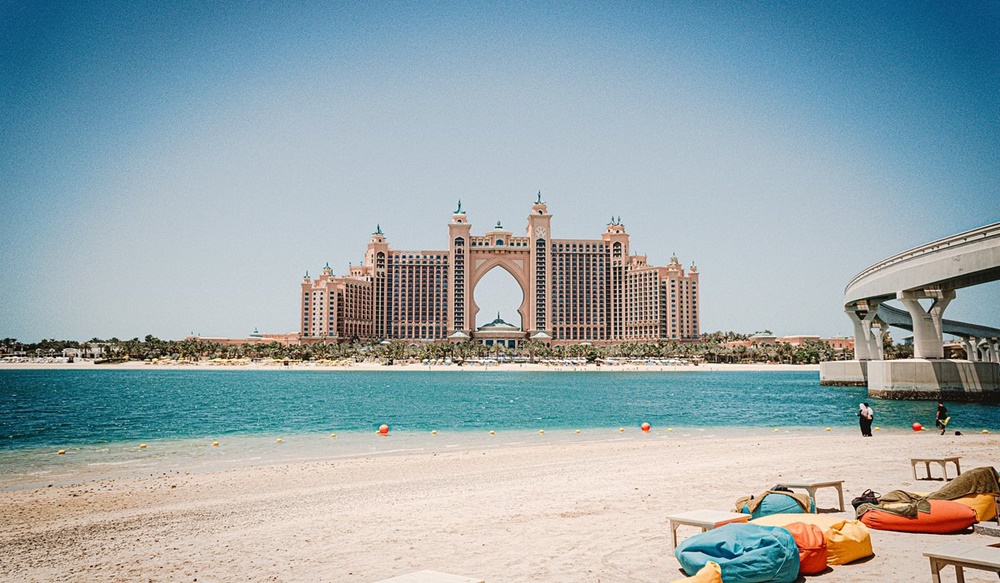
Dubai experiences a significant decrease in tourist numbers due to the scorching heat and high humidity levels. Many people, especially families with children, prefer to avoid visiting during this time as outdoor activities become challenging and uncomfortable.
Benefits of Visiting During the Off-Peak Season
Visiting Dubai during the off-peak season, typically during summer, can have several benefits. Here are some advantages of visiting Dubai during this time:
Lower Prices:
One of the major reasons why this is the best time to visit Dubai is the availability of lower prices. You can get services at discounted rates, including a flight ticket to UAE. In addition, hotels in Dubai have special deals to attract visitors. This makes it a more budget-friendly time to explore Dubai, allowing you to save on accommodations and other expenses.
Short Queues and Less Crowded attraction sites:
The off-peak season see a decrease in tourist numbers, resulting in fewer crowds at popular Dubai attractions, shopping malls, and restaurants. So, you can enjoy a more relaxed and tranquil experience, with shorter queues, easier access to attractions, and other things to do in Dubai.
Personalized Experiences:
With fewer tourists this season, you can enjoy more authentic experiences. For instance, more attention and better service at hotels, restaurants, and attractions, creating a more tailored and intimate experience.
Comfortable Indoor Activities:
Dubai’s indoor attractions, such as shopping malls, theme parks, museums, and entertainment centers, provide a welcome escape from the extreme heat during the off-peak season. You can explore these air-conditioned environments and enjoy various indoor activities without worrying about outdoor temperatures.
Availability of Reservations:
Unlike the peak season, when reservations can be difficult to secure, the off-peak season offers better availability for accommodations, restaurants, and activities. Hence, you have a wider range of choices and planning flexibility for your itinerary.
Special Events and Festivals:
Despite being the off-peak season, Dubai still hosts various events and festivals during the summer months. These include cultural celebrations, shopping promotions, and entertainment programs tailored to tourists and residents.
During this season, prepare for intense heat and take necessary precautions to stay cool and hydrated. It is advisable to plan outdoor activities for early morning or late afternoon when temperatures are relatively cooler.
Potential Challenges of Visiting During the Off-Peak Season
While there are advantages to visiting Dubai during the off-peak season, there are also some potential challenges to consider:
Extreme Heat:
The off-peak season in Dubai coincides with the summer months, meaning you will encounter extremely high temperatures and humidity levels. The intense heat can make outdoor activities challenging and uncomfortable.
Limited Outdoor Activities:
Certain outdoor activities may be limited or unavailable due to the extreme heat. Outdoor attractions like desert safaris, outdoor water parks, and rooftop activities may have reduced operations or be closed altogether. Hence, you may focus on indoor attractions and activities to maximize your time in Dubai.
Ramadan Restrictions:
Depending on the timing of the off-peak season, you may encounter the Islamic holy month of Ramadan. Cultural and religious practices may impact food and beverage service availability during daylight hours, and some entertainment venues may have limited operating hours. It is important to know and respect local customs and practices during Ramadan.
Limited Availability of Services:
Since the off-peak season experiences lower tourist numbers, some services and amenities may have reduced operating hours or limited availability. This includes restaurants, shops, and entertainment venues. It is advisable to check operating hours and the availability of specific services or attractions in advance.
Reduced Vibrancy and Festivities:
The off-peak season may lack the vibrant and festive atmosphere that Dubai is known for during the peak tourist season. With fewer tourists, the city may seem quieter and less lively.
Construction and Maintenance:
The off-peak season is a common time for construction and maintenance work in Dubai. As tourist numbers are lower, it provides an opportunity for these activities to take place. Hence, you may encounter construction sites or disruptions in certain areas, affecting the overall experience.
It’s important to note that these challenges vary depending on the specific time and duration of the off-peak season. As you plan, be flexible, and manage your expectations to mitigate these challenges to ensure a smooth and more enjoyable visit to Dubai during the off-peak season.
Shoulder Seasons - The Best Time to Visit Dubai
Shoulder seasons in Dubai refer to the transitional periods between the peak and off-peak seasons, it is the best season to visit Dubai. They occur during spring (March to May) and autumn (October to November). The term “shoulder” is applicable because these periods act as a buffer or bridge between the busier and quieter times of the year.

During these seasons, Dubai experiences a shift in weather and tourist activity. The temperatures are generally milder compared to the scorching summer months or the cooler winter period. It is the best time to visit Dubai when the weather is comfortable, with less humidity and more pleasant conditions for outdoor activities
Spring (March to May): Pros and Cons of Visiting During This Period
Visiting Dubai during the spring season, from March to May, has pros and cons.
Pros:
Pleasant Weather:
Spring in Dubai offers pleasant temperatures, with average highs ranging from the mid-20s to low 30s degrees Celsius (70s to 90s degrees Fahrenheit). The weather is generally comfortable for outdoor activities and exploring the city.
Blooming Landscapes:
Spring brings about a transformation in Dubai’s landscapes with colorful flowers and greenery. Parks and gardens bloom, creating picturesque settings for strolls and enjoying outdoor spaces.
Festivals and Events:
Dubai hosts various festivals and events during spring. From cultural celebrations to music and art festivals, you can immerse in the vibrant local scene and experience the city’s rich cultural offerings.
Shoulder Season Benefits:
As mentioned earlier, the spring season falls within the shoulder season, meaning fewer crowds and more affordable prices than the peak tourist season. You can enjoy shorter lines at attractions, better availability of accommodations, and find deals and discounts.
Cons:
Increasing Temperatures:
Towards the end of spring, temperatures in Dubai start to rise as the summer approaches. The latter part of May can become quite hot, with temperatures reaching the high 30s degrees Celsius (90s degrees Fahrenheit).
Possible Dust Storms:
Dubai occasionally experiences dust storms in spring due to the desert climate. These storms can limit visibility and affect outdoor activities. It’s advisable to stay updated on weather forecasts and take precautions if necessary.
Crowded Tourist Areas:
While spring is considered a shoulder season, popular tourist areas in Dubai can still experience moderate crowds, especially during public holidays and school breaks. Planning and booking attractions and activities in advance is recommended to ensure availability.
Fluctuating Weather:
Spring in Dubai can see some variation in weather, with occasional rainfall and cooler evenings. Packing layers and preparing for sudden changes in weather conditions is advisable.
Visiting Dubai during spring offers pleasant temperatures, blooming landscapes, and the chance to experience festivals and events. However, it would be best to be mindful of increasing temperatures, possible dust storms, and moderate crowds in tourist areas. With proper planning and awareness of the weather conditions, spring can be the best time to visit Dubai and explore.
Autumn (October to November): Pros and Cons of Visiting During this Period
Visiting Dubai during the autumn season, from October to November, has pros and cons. Here are some advantages and disadvantages to consider as you plan your visit.
Pros:
Mild Weather:
Autumn in Dubai brings milder temperatures, with average highs ranging from the mid-20s to low 30s degrees Celsius (70s to 90s degrees Fahrenheit). The weather is generally pleasant for outdoor activities, allowing you to explore the city comfortably.
Festive Atmosphere:
Dubai hosts various festivals and events during the autumn season. From cultural celebrations to food festivals and art exhibitions, there are plenty of opportunities to immerse yourself.
Shoulder Season Benefits:
Autumn falls within the shoulder season, meaning fewer crowds and potentially lower prices than the peak tourist season. You can enjoy shorter lines at attractions, better availability of accommodations, and find deals and discounts.
Pleasant Beach Time:
Dubai’s beaches are still enjoyable in autumn, with warm waters and comfortable temperatures. It’s the best season to visit Dubai to relax by the beach, participate in water sports, or enjoy beachside dining.
Cons:
Transitioning Weather:
While autumn in Dubai generally brings mild temperatures, there can still be fluctuations and occasional hot spells, especially during the early season. It’s important to prepare for varying weather conditions and pack accordingly.
Possible Rainfall:
Autumn in Dubai can see sporadic rainfall, although it is typically limited. However, occasional showers may occur, so checking weather forecasts and having a contingency plan for outdoor activities is advisable.
Crowded Tourist Areas:
While autumn is considered a shoulder season, popular tourist areas in Dubai may still experience moderate crowds, especially during public holidays and school breaks. Planning and booking attractions and activities in advance is recommended to ensure availability.
Reduced Festive Events:
While festivals and events still occur in autumn, their frequency and scale may be less than the peak tourist season. It’s important to check the event calendar and plan accordingly if there are specific festivals or events you wish to attend.
Visiting Dubai during the autumn season offers mild weather, a festive atmosphere, and the benefits of the shoulder season. However, prepare for transitioning weather, with the possibility of rainfall, moderate crowds in tourist areas, and fewer festival options compared to the peak season. With proper planning and flexibility, autumn can be the best time to visit Dubai and enjoy its attractions.
Special Considerations for Dubai's Climate
Dubai has a hot and arid climate with scorching summers and milder winters. Here are useful tips to help you cope and enjoy your visit.
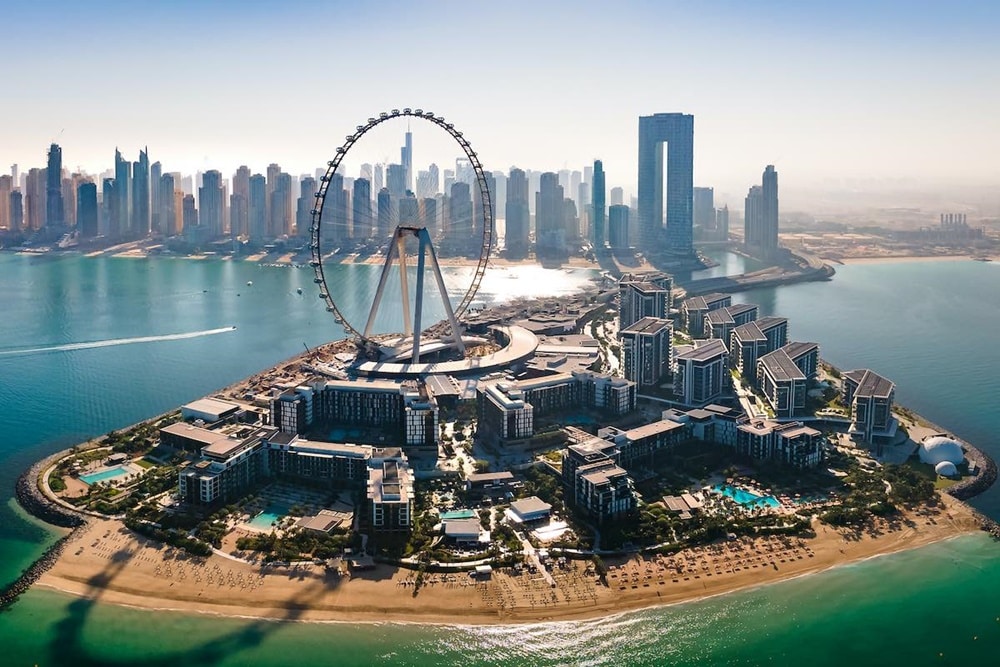
Tips for Dealing with Dubai's Hot Summers
Stay Hydrated:
Drink plenty of water throughout the day to prevent dehydration. Carry a water bottle and drink even if you don’t feel thirsty. Also, avoid excessive caffeinated or sugary drinks, which can contribute to dehydration.
Dress Appropriately:
Wear loose, lightweight, and breathable clothing from natural cotton fabrics. Opt for light colors that reflect sunlight instead of dark colors that absorb heat. Wearing a wide-brimmed hat and sunglasses can also protect you from the sun.
Seek Shade and Air-Conditioning:
Take regular breaks in shaded areas or indoors with air-conditioning to cool down. Dubai is known for its well-air-conditioned buildings and malls, providing relief from the outdoor heat. Plan your activities to include indoor attractions during the hottest parts of the day.
Use Sunscreen:
Apply a broad-spectrum sunscreen with a high SPF (Sun Protection Factor) to protect your skin from harmful UV rays. Reapply it every few hours, especially if you are sweating or swimming. Sunscreen will help prevent sunburn and reduce the risk of skin damage.
Time Outdoor Activities Wisely:
Try to schedule outdoor activities during the cooler parts of the day, such as early morning or evening. Avoid being outdoors during the peak heat hours, typically between 10 am and 4 pm. If you must be outside, take frequent breaks in shaded areas and stay hydrated.
Remember to listen to your body and care for yourself during the hot summers in Dubai. By following these tips, you can better cope with the high temperatures and enjoy your time in the city while staying safe and comfortable.
How to Stay Safe and Comfortable During Sandstorms in Dubai
During sandstorms in Dubai, it’s essential to prioritize your safety and take measures to stay comfortable. It’s advisable to;
Stay Indoors:
If you’re aware of an approaching sandstorm or if one is already occurring, it’s best to remain indoors as much as possible. Close all windows and doors to prevent dust from entering your living space. Ensure that your accommodation has a properly sealed environment.
Use Air Purifiers:
Consider using air purifiers or air conditioning systems with effective filters to help remove dust particles from the indoor air. This will help maintain a cleaner and healthier breathing environment.
Protect Your Eyes and Airways:
If you need to go outside during a sandstorm, wear protective eyewear such as goggles or sunglasses to shield your eyes from blowing sand particles. You can also use a face mask or a scarf to cover your nose and mouth to reduce the inhalation of dust.
Drive with Caution:
Exercise extreme caution if you drive during a sandstorm. Reduce your speed, turn on your headlights, and maintain a safe distance from other vehicles. Be aware that visibility may be significantly reduced, and roads may become slippery due to the dust.
Stay Informed:
Keep yourself updated with weather reports and warnings from local authorities regarding sandstorms. Follow their advice and instructions to ensure your safety. Monitor news channels, official websites, or weather apps for the latest information.
Stay Hydrated:
During sandstorms, the air can be dry, so drinking plenty of water is important. Plus, consider using a humidifier indoors to add moisture to the air and prevent discomfort.
Clean and Protect Your Electronics:
Dust particles from sandstorms can enter electronic devices and cause damage. Keep them covered or stored safely during sandstorms, and clean regularly to prevent dust accumulation.
Remember that sandstorm can vary in intensity, and it’s crucial to prioritize your safety above all. If the conditions become severe or if you feel unsafe, seek shelter in a designated safe area until the sandstorm passes.
Recommendations for Appropriate Clothing and Accessories Throughout the Year
Here are recommendations for appropriate clothing and accessories throughout the year in Dubai, considering each season:
Summer (June to September):
- Lightweight and breathable clothing: Opt for loose-fitting and lightweight fabrics like cotton or linen to stay cool in the hot and humid weather.
- Shorts, skirts, and dresses: Choose comfortable and airy bottoms for better air circulation.
- Short-sleeved tops and T-shirts: Wear breathable tops to help keep you cool.
- Sun protection: Wear a wide-brimmed hat, sunglasses, and apply sunscreen with a high SPF to protect yourself from the intense sun.
- Open-toed sandals or breathable shoes: Opt for footwear that allows your feet to breathe and stay cool.
Autumn (October to November):
- Light layers: Layering becomes important as temperatures cool down. Wear light jackets, cardigans, or long-sleeved shirts that can be easily removed.
- Comfortable trousers or jeans: Choose comfortable bottoms that provide warmth in the evenings.
- Closed-toe shoes or sandals: As temperatures fluctuate, closed-toe shoes or sandals can offer versatility and protection.
Winter (December to February):
- Warmer clothing: Dubai’s winter is mild, but it can still feel cooler, especially in the evenings. Pack sweaters, long-sleeved tops, and lightweight jackets.
- Trousers or jeans: Opt for long pants to warm your legs.
- Closed-toe shoes or boots: Choose footwear that provides warmth and comfort for cooler temperatures.
- Scarf or shawl: Carry a lightweight scarf or shawl to add extra warmth when needed.
Spring (March to May):
- Light layers: Similar to autumn, layering is key during spring. Choose light jackets, cardigans, or long-sleeved shirts that can be easily added or removed.
- T-shirts and blouses: Wear breathable tops in lighter fabrics.
- Trousers, skirts, or dresses: Choose comfortable and versatile bottoms to adapt to changing temperatures.
- Open-toed sandals or breathable shoes: Opt for footwear that allows air circulation and keeps your feet comfortable.
Plus, here are general dressing recommendations:
- Modest attire: Respect local customs by dressing modestly when visiting public places and cultural sites.
- Carry a light jacket or shawl: Indoor spaces like malls and restaurants in Dubai are often air-conditioned, so having a light layer for comfort is handy.
- Accessories: Remember to carry a sun hat, sunglasses, and sunscreen throughout the year to protect yourself from the sun’s rays.
Conclusions
The best time to visit Dubai actually depends on individual preferences and priorities. Here’s a recap of the different seasons and their suitability for various preferences:
Summer (June to September):
Ideal if you are a budget traveler seeking indoor attractions and interested in shopping during the Dubai Summer Surprises. However, be prepared for extreme heat and higher humidity levels.
Autumn (October to November):
Suitable if you prefer milder temperatures, fewer crowds, and the opportunity to participate in festivals like the Dubai Food Festival and the Dubai Fitness Challenge.
Winter (December to February):
Perfect if you are an outdoor enthusiast, beach lover, and seeking pleasant weather. It’s the peak tourist season, offering various events like the Dubai Shopping Festival and the Dubai International Jazz Festival.
Spring (March to May) - Best Time to Visit Dubai:
This is the best time to visit Dubai and enjoy pleasant temperatures, cultural experiences, and outdoor activities. The Dubai World Cup horse racing event and the Dubai International Film Festival are the highlights of this period.
However, regardless of your chosen season, Dubai promises a memorable experience for tourists. Embrace the unique offerings of your selected season and make the most of your trip by planning. Research and book accommodations, attractions, and activities to secure the best deals and availability.
Dubai welcomes visitors with its world-class attractions, luxurious resorts, culinary delights, and unparalleled shopping experiences. So, get your UAE visa, pack your bags, plan your itinerary, and embark on an unforgettable journey to Dubai. Whether you’re seeking adventure, relaxation, or cultural exploration, Dubai has it all, and your chosen season will add charm to your experience.


